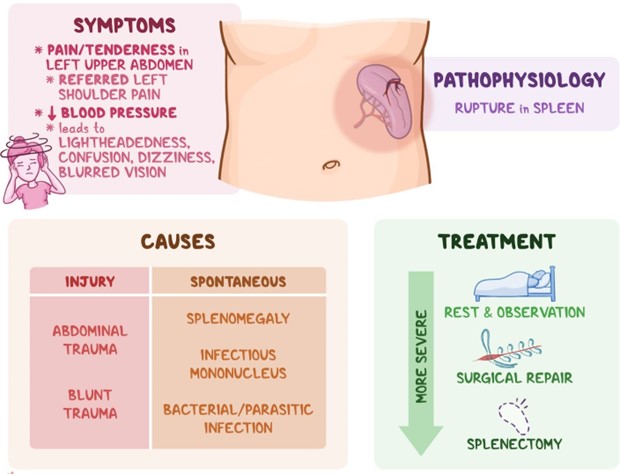A first-response team is working at the location of a bombing incident. A nurse triaging a group of clients should give treatment priority to which of the following clients?
A client who has superficial partial-thickness burn injuries over 5% of his body.
A client who is ambulatory and exhibits manic behavior.
A client who has a rigid abdomen with manifestations of shock.
A client who has a femur fracture with a 2+ pedal pulse.
The Correct Answer is C
This indicates that the client may have internal bleeding, which is a life-threatening condition that requires immediate medical attention. The nurse should provide supportive care, such as administering oxygen, and arrange for rapid transport to a trauma center.
The client with superficial partial-thickness burn injuries over 5% of his body may require medical attention, but this is not immediately life-threatening.
The client who is ambulatory and exhibits manic behavior may require psychological support, but this is not a priority in the acute phase of a traumatic event.
The client who has a femur fracture with a 2+ pedal pulse may require immobilization and pain management, but this is also not a priority in the acute phase of a traumatic event.

Nursing Test Bank
Naxlex Comprehensive Predictor Exams
Related Questions
Correct Answer is C
Explanation
Carrying a baby with you as you move around the house helps prevent falls and other accidents.
Option a is incorrect because warming a baby's bottle in the microwave can cause hot spots and burn the baby's mouth. Bottles should be warmed using a bottle warmer or by placing them in warm water.
Option b is incorrect because limiting cuddling time with grandparents does not prevent spoiling. Infants benefit from positive interactions and affection from all caregivers.
Option d is incorrect because using baby talk can hinder language development. It is important to speak to babies using proper grammar and age-appropriate vocabulary to promote language skills.
Correct Answer is D
Explanation
In a health maintenance organization (HMO), the provider is paid a set amount of money for each client enrolled in the program. This payment structure is known as capitation.
The provider is responsible for providing all necessary healthcare services to the client within the confines of the capitated payment.
The client is not required to pay the provider directly for any services rendered within the HMO network.
Whether you are a student looking to ace your exams or a practicing nurse seeking to enhance your expertise , our nursing education contents will empower you with the confidence and competence to make a difference in the lives of patients and become a respected leader in the healthcare field.
Visit Naxlex, invest in your future and unlock endless possibilities with our unparalleled nursing education contents today
Report Wrong Answer on the Current Question
Do you disagree with the answer? If yes, what is your expected answer? Explain.
Kindly be descriptive with the issue you are facing.
